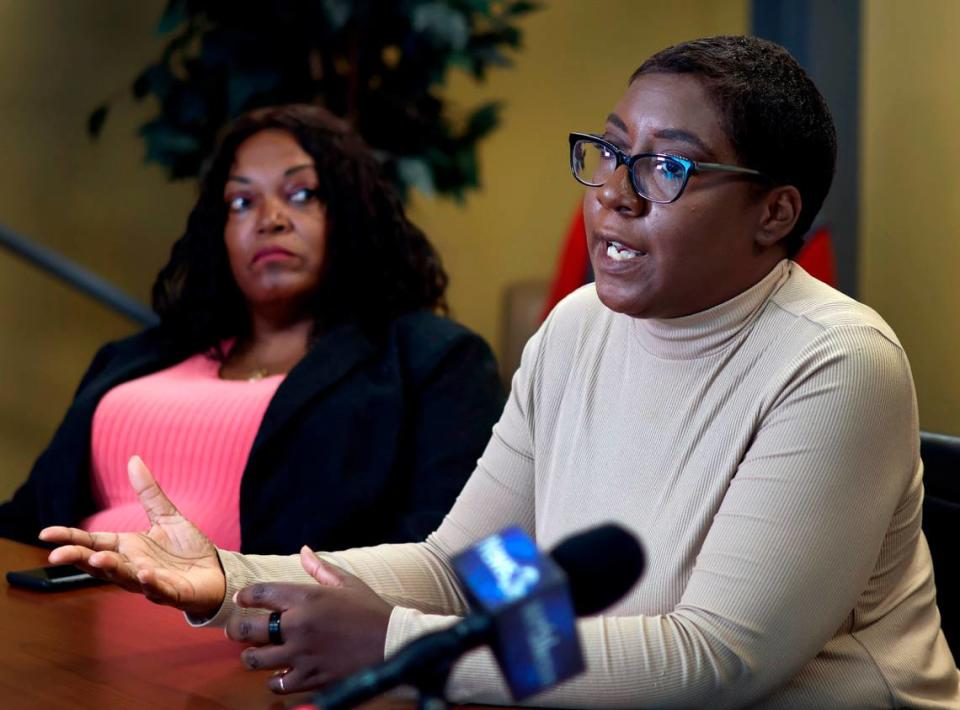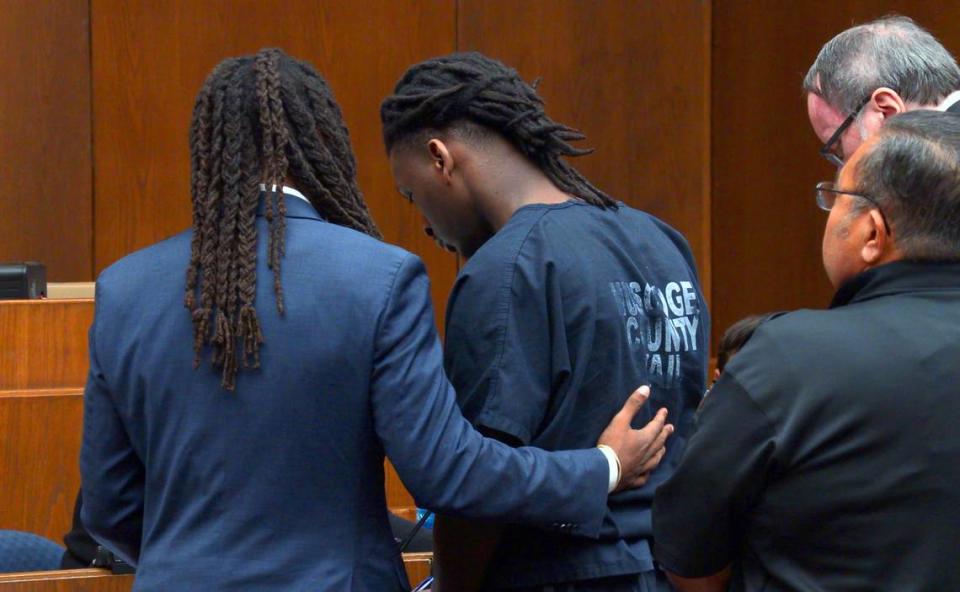Family of Columbus coach killed in 2016 police chase seeks change in pursuit policy
The family of a Carver High School coach killed in a 2016 crash with a suspect Columbus police were chasing is urging the city to change its police pursuit policies and purchase liability insurance.
That was the message attorney Katonga Wright conveyed Wednesday at a news conference with the family of Carver baseball coach David Pollard, who fatally was injured on April 18, 2016.
Wright has filed suit against the city on behalf of Adrienne Pollard, the coach’s widow. The lawsuit initially was filed in federal court before Wright dropped it and refiled it in 2019 in Muscogee State Court.
State Court Judge Andy Prather ruled Aug. 1 that the city was not entitled to immunity from the Pollard claim, but he allowed the city to appeal that.
Wright said the Georgia Court of Appeals has upheld Prather’s decision, and sent the case back for trial. But no date has been set.
The family’s initial claim against the city sought $13 million. Wright said that because the city is self-insured, as opposed to purchasing liability insurance for such claims, it has capped such payouts at $500,000.
“The suit still stands at over a million,” Wright said Wednesday.
Adrienne Pollard said the amount of the claim is not her primary concern.
“I was thinking that number’s not really important to me, but accountability is,” she said.

In pushing for changes in pursuit policy, Wright said news media reports show 5,000 people were killed in police pursuits from 1979 to 2013, and half of those killed were not the people police were chasing.
“Most bystanders were killed in their own cars by a fleeing driver,” she told reporters Wednesday. Often the chases are initiated for minor traffic violations, she said.
Now that Columbus has a new police chief and sheriff, it should take another look at pursuit policies, she said.
“We request that our local chase policies be evaluated and reconsidered,” she said, later adding:
“To help prevent other tragic and senseless deaths, we request our police chief and sheriff to adopt the policy that officers are not authorized to engage in a vehicle pursuit in order to subdue an escaping suspect who presents no imminent threat of death or serious injury.”
Police pursuits for property crimes, misdemeanors, traffic violations, or civil offenses be “specifically outlawed,” she said, adding that Atlanta allows police chases only when the threat of death is imminent.
Columbus Mayor Skip Henderson issued this statement on the Pollard case Wednesday afternoon:
“The Columbus police officers in this matter performed appropriately. The tragic accident involving Coach Pollard was the direct result of the grossly negligent acts of the party that stole a vehicle and fled recklessly. The case awaits trial in state court and the City will be defended vigorously.”
The city has hired lawyers from the Columbus firm Page, Scrantom, Sprouse, Tucker & Ford to defend it in the lawsuit.
Muscogee Sheriff Greg Countryman said he respected Wright’s position in representing her client, but he declined comment on the case.
What’s the police chase policy?
Police Chief Stoney Mathis also declined comment on Wright’s requests, saying he already has revised the department’s pursuit policy since he took the job earlier this year.
The new policy says officers may chase only suspects who have committed or are likely to commit a forcible felony, such as murder, aggravated assault, kidnapping, rape, armed robbery or similarly violent offense.
It also says officers “should not needlessly endanger other persons,” and must consider whether traffic conditions present that risk during times with “a high level of business, school or other activity.”
Officers in unmarked police vehicles equipped with lights and sirens may chase only suspects who present an “immediate or direct threat to life or property,” it says.
It says a chase should be called off not only when it endangers other motorists, but when the suspect has been identified and may be captured later, the suspect has outrun police and can’t be caught, or the police vehicle is unsafe.
Here are excerpts of the previous policy, as reported in a review of fatal police pursuits in 2017:
“It is the policy of the Columbus Police Department that a motor vehicle pursuit is justified ONLY when the necessity of immediate apprehension outweighs the level of danger created by the pursuit.”
Supervisors were charged with calling off any chases deemed too dangerous.
“The unit’s sergeant shall continuously review the incoming information to determine whether the pursuit should be continued or terminated.... The pursuing officer must constantly consider the risk created by the pursuit. He should not needlessly endanger other persons.”

The suspect
The man police were chasing before the fatal crash was William C. Cross, who pleaded guilty in the criminal case in September 2019.
He was sentenced to 25 years in prison for homicide by vehicle, auto theft, hit and run, fleeing police and obstructing officers.
The judge said Cross had caused a “senseless tragedy,” noting that Cross not only had led police on a chase in a stolen car, but had run a red light and then had run from the crash scene at Buena Vista Road and Morris Road.

Cross was 19 at the time, and had no criminal history.
At Cross’ sentencing, Pollard’s sister, Kimberley Render, said her brother tried to guide students like Cross. “Many say you are the type of student that he was working so hard to help,” she told him.
Pollard was buying school supplies the day he died, prosecutors said.
He was going through a green light on Morris Road at Buena Vista Road about 1 p.m. when his Chevy Impala was T-boned on the driver’s side by the westbound 2007 Audi A8 that Cross was driving.
The 36-year-old coach died at the scene, from extensive trauma.

At first investigators had no idea who stole the Audi from a home in the 1800 block of Somerset Avenue, where neighbors saw the thief take the car, followed it, took a picture of the driver and called police.
They followed it on Interstate 185 to Buena Vista Road, where Officer Walter Haywood started chasing it, with Cross reaching speeds of almost 80 mph through the heavy lunchtime traffic. Haywood decided the road was too congested to continue the pursuit, and broke off.
Then Officer Isaac Neal saw the Audi going west on Buena Vista Road, and made a U-turn. The city later claimed Neal was not joining the pursuit, only turning around to go back to the police station to file reports.
Though Cross initially escaped, he left behind evidence that enabled police to track him down, finally arresting him on on May 2, 2016.

